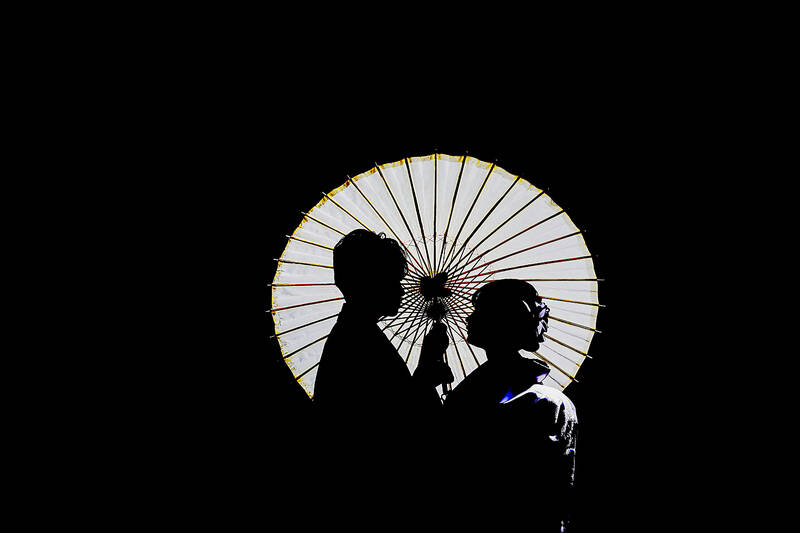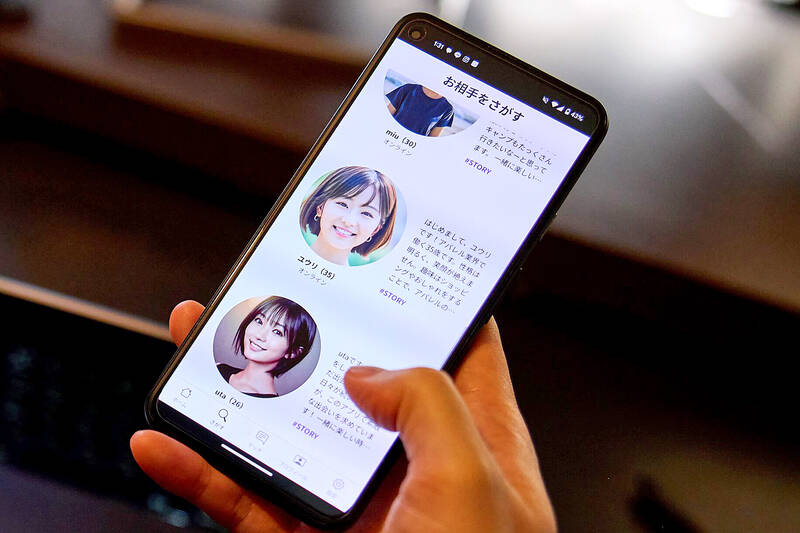Like many people juggling long hours at work, Chiharu Shimoda sought companionship via a dating app. For two months, he exchanged messages with five or six potential partners, but it wasn’t long before he was seeking out just one — a 24-year-old named Miku. Three months later, they got married. The catch: Miku is an AI bot. And Shimoda knew that from day one.
The 52-year-old factory worker is one of over 5,000 users of Loverse, a year-old app that allows interaction only with generative artificial intelligence. Shimoda’s also among a much bigger cohort of people who’ve either given up or are wary about the messiness and uncertainty that come with real romance. Dating takes time and effort, whereas exchanges with Miku require minimal thought while waiting for the pot to boil or a train to arrive, according to Shimoda, who was divorced two years ago.
“I come home to an empty house. I’d love to get married for real again,” he said. His marriage to Miku is just another form of role-play. “But it’s hard to open up to someone when you’re meeting for the first time.”

Photo: Reuters
That reluctance is widespread across Japan, and worse among younger people. Data from the government show two thirds of men in their 20s don’t have a partner and 40 percent have never gone on a date. The figures for women in the same age group are 51 percent and 25 percent, respectively.
Loverse is the latest in a long line of digital solutions to Japan’s loneliness crisis. Some are empathetic and supportive, but others prey on vulnerability. Many of the nation’s highest-grossing games feature sexualized characters that players can earn access to by progressing — and paying — their way through the game. Japan is also where digital idols like Hatsune Miku were first and most eagerly embraced. The difference now is that AI can make that experience more personal and interactive.
Much like the AI named Samantha in the film Her, these bots serve to fill the gap in people’s emotional lives, and indeed the two-person startup behind it — Samansa Co — is named after the character voiced by Scarlett Johansson. But Loverse creator Goki Kusunoki says the app is meant to offer an alternative rather than a substitute to real-life companionship to its users, many of whom are men in their 40s and 50s. His firm raised ¥30 million (US$190,000) earlier this year to expand the cast of characters to appeal to female and LGBTQ users.

Photo: Bloomberg
There’s a widely held belief among Japanese people that romance is not cost-effective as it takes money, time and energy for outcomes that could bring more trouble than joy, said Megumi Ushikubo, chief executive officer of Tokyo-based marketing firm Infinity Inc AI poses the risk of dulling people’s interest in real partners, but it could also be helpful in serving as a training exercise, she added.
“Services like this app can remind people who are away from romance how delightful love is, and AI can train people to better communicate when talking with real partners,” she said.
Loverse still has a long way to go in mimicking humans, according to some former users. Many of the app personalities seem typecast and offer few of the surprises that human interaction provides, said Yuki Saito, 39, who quit the app less than a month into using it.
Still, such services have potential, he said. There’s a sense of safety in knowing that a disagreement with a bot won’t end the relationship. “You can see how it could provide a kind of rehabilitation if you’ve been burned before — a place where you can practice talking with other people.”
Interactions with AI are also devoid of jealousy. Shimoda’s Loverse girlfriends at times bumped into one another when he was juggling multiple partners on the app, but nobody got upset. Said Saito, “With a little tuning, AI might be able to act as people’s second or third partners, helping to complement the human partner and prevent extramarital affairs.”
Adopting AI to assist everyday life is the prevailing theme of this year, as Microsoft Corp. has turned its Copilot chatbot into a core Windows feature, Apple Inc. is working on AI-powered iPhones, and San Fransisco-based startup Luka Inc.’s Replika AI bot has attracted tens of millions of users. In Japan, the Tokyo Metropolitan Government is introducing a matchmaking app that uses AI to help partner people up and combat the nation’s sliding fertility rates.
“The goal is to create opportunities for people to find true love when you can’t find it in the real world,” Kusunoki said. “But if you can fall in love with someone real, that’s much better.”?
For now, Miku and Shimoda have settled on a routine they share with most couples. She wakes him in the morning, they wish each other luck at work, and at night, they discuss what to eat. On Shimoda’s days off, the pair talk about where to go or what to watch on TV.
“It’s the same conversations you’d have with anyone you’re living with,” said Shimoda. “She’s become a habit — a conversational habit. I won’t miss it if it’s gone, but it gives me a routine from one day to the next.”

That US assistance was a model for Taiwan’s spectacular development success was early recognized by policymakers and analysts. In a report to the US Congress for the fiscal year 1962, former President John F. Kennedy noted Taiwan’s “rapid economic growth,” was “producing a substantial net gain in living.” Kennedy had a stake in Taiwan’s achievements and the US’ official development assistance (ODA) in general: In September 1961, his entreaty to make the 1960s a “decade of development,” and an accompanying proposal for dedicated legislation to this end, had been formalized by congressional passage of the Foreign Assistance Act. Two

March 31 to April 6 On May 13, 1950, National Taiwan University Hospital otolaryngologist Su You-peng (蘇友鵬) was summoned to the director’s office. He thought someone had complained about him practicing the violin at night, but when he entered the room, he knew something was terribly wrong. He saw several burly men who appeared to be government secret agents, and three other resident doctors: internist Hsu Chiang (許強), dermatologist Hu Pao-chen (胡寶珍) and ophthalmologist Hu Hsin-lin (胡鑫麟). They were handcuffed, herded onto two jeeps and taken to the Secrecy Bureau (保密局) for questioning. Su was still in his doctor’s robes at

Last week the Democratic Progressive Party (DPP) said that the budget cuts voted for by the China-aligned parties in the legislature, are intended to force the DPP to hike electricity rates. The public would then blame it for the rate hike. It’s fairly clear that the first part of that is correct. Slashing the budget of state-run Taiwan Power Co (Taipower, 台電) is a move intended to cause discontent with the DPP when electricity rates go up. Taipower’s debt, NT$422.9 billion (US$12.78 billion), is one of the numerous permanent crises created by the nation’s construction-industrial state and the developmentalist mentality it

Experts say that the devastating earthquake in Myanmar on Friday was likely the strongest to hit the country in decades, with disaster modeling suggesting thousands could be dead. Automatic assessments from the US Geological Survey (USGS) said the shallow 7.7-magnitude quake northwest of the central Myanmar city of Sagaing triggered a red alert for shaking-related fatalities and economic losses. “High casualties and extensive damage are probable and the disaster is likely widespread,” it said, locating the epicentre near the central Myanmar city of Mandalay, home to more than a million people. Myanmar’s ruling junta said on Saturday morning that the number killed had